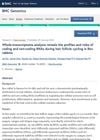 October 2022 in “Research Square (Research Square)”
October 2022 in “Research Square (Research Square)” Key genes linked to immune response are highly active in lupus-affected hair follicles.
 June 2018 in “Surgical Case Reports”
June 2018 in “Surgical Case Reports” S-1 treatment led to a complete response in pancreatic cancer with manageable side effects.
 April 2023 in “Journal of Investigative Dermatology”
April 2023 in “Journal of Investigative Dermatology” SOX2 helps reduce wound size and pressure ulcer formation by suppressing oxidative stress and increasing antioxidant activity in mice.
 3 citations,
June 2021 in “Clinical, Cosmetic and Investigational Dermatology”
3 citations,
June 2021 in “Clinical, Cosmetic and Investigational Dermatology” Dermoscopy is an effective tool for accurately detecting skin cancers.
224 citations,
February 2013 in “The Journal of clinical investigation/The journal of clinical investigation” ERG increases SOX9, promoting prostate cancer growth and invasion.
36 citations,
October 2015 in “Cell reports” Gab1 protein is crucial for hair growth and stem cell renewal, and Mapk signaling helps maintain these processes.
 20 citations,
January 2022 in “Polymers”
20 citations,
January 2022 in “Polymers” Nanoparticles added to natural materials like cellulose and collagen can improve cell growth and wound healing, but more testing is needed to ensure they're safe and effective.
16 citations,
December 2020 in “PloS one” Researchers found WNT10A to be a key gene in developing goat hair follicles.
10 citations,
March 2021 in “Annals of palliative medicine” PRP shows promise in healing but needs a standardized, safe preparation method.
 9 citations,
April 2021 in “Frontiers in Immunology”
9 citations,
April 2021 in “Frontiers in Immunology” Unconventional lymphocytes are important for quick immune responses and healing of skin and mucosal barriers.
 4 citations,
June 2022 in “BioMed Research International”
4 citations,
June 2022 in “BioMed Research International” Using mesenchymal stem cells or their exosomes is safe for COVID-19 patients and helps improve lung healing and oxygen levels.
3 citations,
March 2023 in “Biology” Genes affecting wool fiber thickness in Angora rabbits were identified, which could help breed finer wool.
3 citations,
May 2013 in “International journal of molecular sciences” Epidermal stem cells show promise for treating orthopedic injuries and diseases.
2 citations,
May 2023 in “Biology” New mouse models of Pemphigus show severe symptoms and need better treatments.
 1 citations,
August 2022 in “Molecules”
1 citations,
August 2022 in “Molecules” Prunus mira kernels contain components that can promote hair growth in mice.
1 citations,
April 2018 in “Journal of dairy science” Dairy cows' skin and hair follicles change size and growth phase around the time they give birth.
 January 2025 in “BMC Genomics”
January 2025 in “BMC Genomics” Key genes and RNA networks regulate hair growth and follicle density in Rex rabbits.
 April 2024 in “The Journal of experimental medicine/The journal of experimental medicine”
April 2024 in “The Journal of experimental medicine/The journal of experimental medicine” Treg cells help repair and regenerate tissues by interacting with local cells.
Genetic analysis of rabbits identified key genes for traits like coat color, body size, and fertility.
 February 2024 in “BMC genomics”
February 2024 in “BMC genomics” The TRPV3 gene variant may cause the long-haired suri alpaca coat.
 November 2023 in “The journal of investigative dermatology/Journal of investigative dermatology”
November 2023 in “The journal of investigative dermatology/Journal of investigative dermatology” Skin cells and certain hair follicle areas produce hemoglobin, which may help protect against oxidative stress like UV damage.
September 2023 in “Animals” Genes linked to wool fineness in sheep have been identified.
 January 2020 in “Journal of Clinical Biochemistry and Nutrition”
January 2020 in “Journal of Clinical Biochemistry and Nutrition” Low zinc levels in chronic liver disease patients are linked to more severe symptoms like taste issues and skin problems, and zinc supplements might help.
April 2022 in “Medical Molecular Morphology”  134 citations,
January 2010 in “Biomedical research”
134 citations,
January 2010 in “Biomedical research” Low oxygen conditions increase the hair-growing effects of substances from fat-derived stem cells by boosting growth factor release.
 7 citations,
September 2017 in “Biomedical and Pharmacology Journal”
7 citations,
September 2017 in “Biomedical and Pharmacology Journal” Growth factors greatly affect hair loss, with different levels seen in men, women, younger patients, and at the start of the condition.
 1 citations,
June 2023 in “Journal of Cellular and Molecular Medicine”
1 citations,
June 2023 in “Journal of Cellular and Molecular Medicine” The new method using gene-modified stem cells and a 3D printed scaffold improved skin repair in mice.
 4 citations,
May 2021 in “The American Journal of Surgical Pathology”
4 citations,
May 2021 in “The American Journal of Surgical Pathology” Cutaneous Lymphadenoma is a unique skin tumor with specific protein markers and common gene mutations that may cause continuous cell growth.
107 citations,
June 1997 in “PubMed” EGFR is essential for normal hair development and follicle differentiation.
10 citations,
December 2015 in “Experimental dermatology” EGFR helps mouse hair follicles stop growing by reducing certain growth regulators.

















